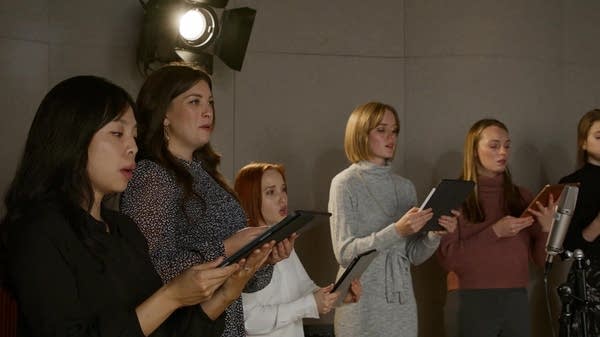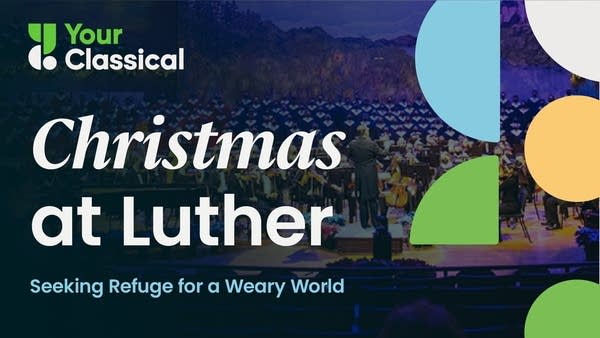On small events, the course of a career, even a lifetime, can hinge.
One day last summer, when Eli Hooker Reese was sifting through a list of composing competitions he might enter, one name popped off the page at him: the King's Singers.
"I realized I had actually sung an arrangement of their performance of Billy Joel's 'And So It Goes' in one of my Minnetonka High School ensembles," he recalls.
"I knew they were a pretty high level ensemble, and I thought it would be pretty cool to enter a competition they were hosting."
And so Hooker Reese entered it — "just for fun," he says, as by his own admission he hadn't composed any choral pieces previously.
His inexperience proved irrelevant. In mid-January, his rookie choral composition was announced as one of four winners in a field of 347 entrants for the inaugural King's Singers New Music Prize. It will be featured in a special webcast hosted by Washington National Cathedral on Sunday, Feb. 28.

Hooker Reese's winning entry for the under-18 section of the competition is titled "When All Falls Silent." It sets a poem by writer and composer Charles Anthony Silvestri.
The process of writing the five-minute setting came relatively easily to the then-17 composer.
"The very first time I read 'When All Falls Silent,' I knew the melody that would anchor this piece," Hooker Reese remembers. "And there wasn't really any pressure or stress, because it wasn't a commission or anything like that."
Two hours fleshing out his initial ideas at the piano, and he had a basic template for the path that "When All Falls Silent" would follow.
"And then I spent probably three hours every night for a week putting it into my notation software, figuring out how I could lead the voices, and arrange these ideas into the final score," he says.
The results were stunningly successful. The competition jury (which included King's Singers bass Jonathan Howard) hailed Hooker Reese's handiwork as a "gem of lyricism and open voicings that truly allow for its beautiful harmonies to shine."
And while Hooker Reese is nominally a novice in the art of choral composition, his astonishingly assured setting of "When All Falls Silent" — influenced, he says, by storied American composer Eric Whitacre — did not exactly emerge from thin air.
"I've been immersed in music my entire life, I started taking violin lessons at age 7, I've been teaching myself piano for as long as I can remember, and I think I've been in every high school ensemble a tenor can sing in," he explains.
"When I was growing up, my dad played fiddle in a traditional music band, for my mom's Appalachian clogging group. So I would always be listening to them or going to my mom's rehearsals."
Like many young musicians nowadays, Hooker Reese is notably eclectic in his interests, ignoring conventional genre boundaries and what he calls "putting things in boxes."
"A lot of what I've written up to this point hasn't been classical," he says. "I've done a lot of popular music, songs and traditional fiddle tunes."
Some of this music is about to be released for broader public consumption. He plans to release an album in early May, entirely self-performed and recorded at home in Minnetonka with what he calls "your classic bedroom producer setup."
A debut album from his three-piece band Sedona also is coming soon, in an idiom he describes as "striving to combine every influence possible," from the Beach Boys to Los Angeles band Wallows and guitarist John Mayer.
At 3 p.m. central Sunday, however, Reese will be tuned in to the Washington National Cathedral website, where its choir will give the world premiere of all four winning pieces in the New Music Prize, joined by the King's Singers.
"I haven't heard the final recording yet, but earlier this month I did listen online to the cathedral choir sing my piece during the rehearsal," he says.
"And I actually met Tony Silvestri virtually that day, who wrote the amazing poem I set. He said he liked my piece, which was awesome."
So what comes next? Has the New Music Prize radically altered Hooker Reese's ideas for what he might do in the future?
Not yet. For now, he is completing his senior year at Minnetonka High School. His days of in-person attendance are reduced to two because of the coronavirus, and he is hankering for a return to live performances with the Minnetonka Concert Choir.
Beyond that, "go to college for something, and try to keep composing unique and original stuff," is the rough plan of action at present.
Despite the dizzy-making breadth of his musical activities, Hooker Reese has no doubt that his King's Singers competition success has sharpened his appetite to explore the classical idiom further, particularly choral composition.
"I never would have expected to win any recognition for my first attempt at composing choral music, much less this prize from one of the groups that began my fascination with its beauty," he says.
"I feel more confident now in continuing to diversify and share my work, and I'm excited to keep learning about choral composition."
Event details
The King's Singers New Music Prize Online Concert
When: 3 p.m. central Sunday, Feb. 28
Cost: $10

This activity is made possible in part by the Minnesota Legacy Amendment‘s Arts & Cultural Heritage Fund.
Love the music?
Show your support by making a gift to YourClassical.
Each day, we’re here for you with thoughtful streams that set the tone for your day – not to mention the stories and programs that inspire you to new discovery and help you explore the music you love.
YourClassical is available for free, because we are listener-supported public media. Take a moment to make your gift today.










